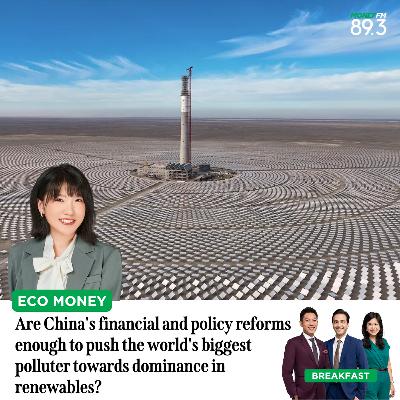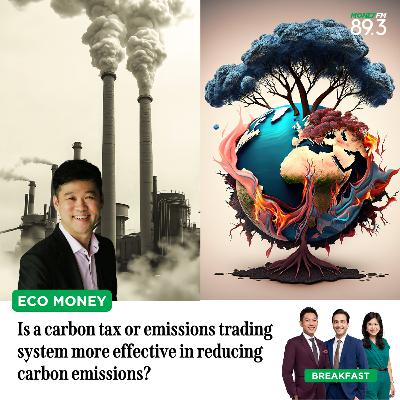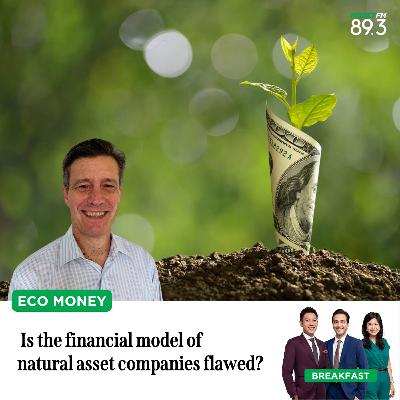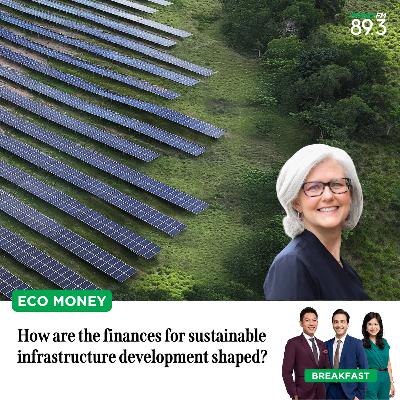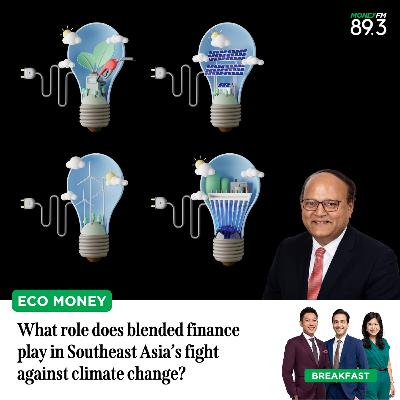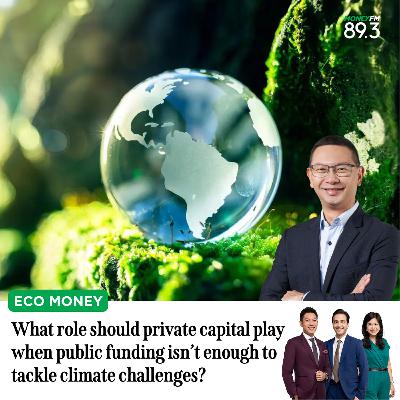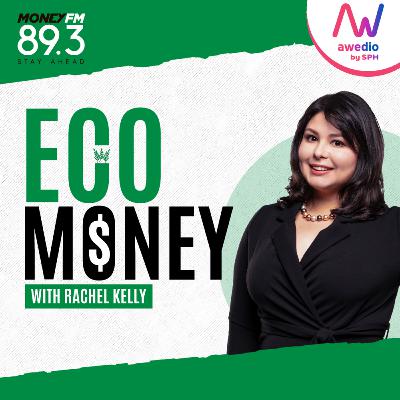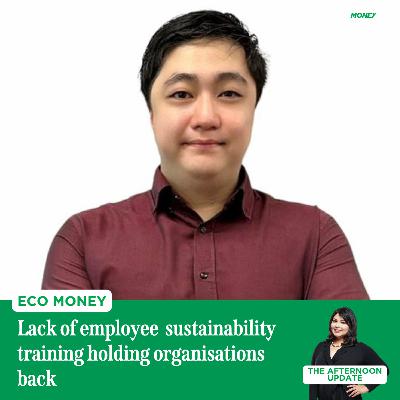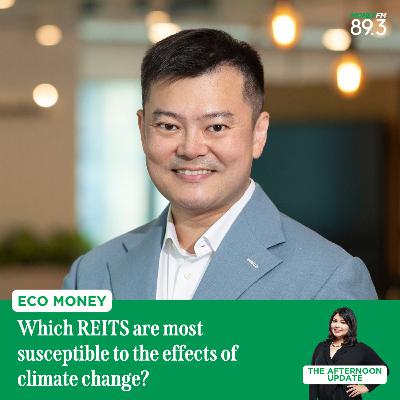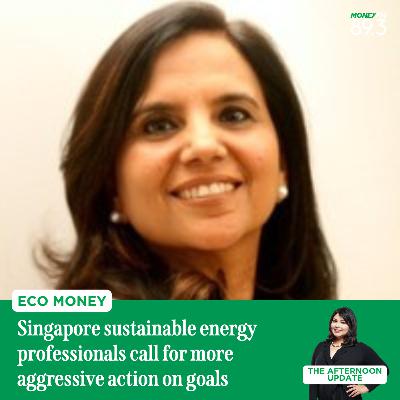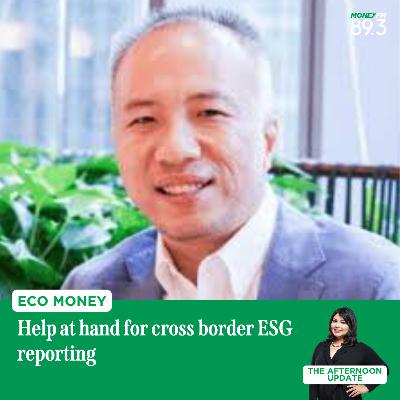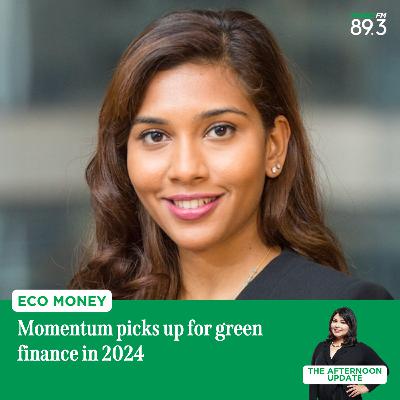Discover Eco Money
Eco Money

91 Episodes
Reverse
At a time when the threat of climate change is prompting countries to reshape their environmental and energy policies, China's commitment through investments, manufacturing prowess and supportive policies is anchoring its leadership in the clean energy sphere. With the shift in stance by the Trump administration towards climate change, China now leads in global investment in clean energy, channelling substantial amounts into projects across solar and wind power, EVs and battery production. Over the last two decades, China has achieved stunning growth in its installed renewable capacity, far outpacing the rest of the world. It currently produces 31% of its electricity from renewable sources including wind, solar, hydroelectricity, and geothermal. While the country is still heavily reliant on coal, estimates predict that by 2026 solar will overtake the fossil fuel as China’s leading energy source. On this episode of Eco Money, Ivy Yin, Market Specialist for Energy Transition and Carbon at S&P Global shares her insight on whether China's financial and policy reforms are enough to push the world's biggest polluter towards dominance in renewables. Presented by: Audrey SiekProduced by: Yeo Kai Ting (ykaiting@sph.com.sg) Photo credits: VCG / AP PhotoSee omnystudio.com/listener for privacy information.
With an emissions trading system, the policy involves setting a total cap or limit on carbon emissions, which makes companies switch to low-emission or renewable energy sources. In contrast, a carbon tax establishes a price directly on carbon emissions so that companies are charged a certain amount for every tonne of emissions produced. While some countries have adopted both an ETS and a carbon tax, other countries have chosen to adopt one policy only. But, the question is - which policy can more effectively reduce carbon emissions? On this episode of Eco Money, Daniel Lee, Associate Professor of Practice at the Nanyang Business School and Director of the Carbon Markets Academy at NTU’s College of Business shares his insights. Presented by: Emaad AkhtarProduced by: Yeo Kai Ting (ykaiting@sph.com.sg) Photo credits: pixabay & its talented community of contributorsSee omnystudio.com/listener for privacy information.
Carbon offsets first took off in the 2000s when the UN launched the Clean Development Mechanism. For those who might not be familiar, carbon credits are intended to reduce, remove, or avoid emissions. But while the intentions are good for our planet, companies working to generate climate benefits through credit purchases often grapple with the differences and uncertainties of credit quality to ensure that those benefits are real. Beyond differences, bad practice and questionable science in the voluntary carbon markets mean that firms relying on offsetting to hit net zero targets risk greenwashing. So, do carbon offset projects necessarily meet set targets, and can the results be reliably measured? On this episode of Eco Money, Dr Ruipeng Liu, Senior Lecturer for the Finance Group at Deakin Business School shares his insights. Presented by: Audrey SiekProduced by: Yeo Kai Ting (ykaiting@sph.com.sg) Photo credits: pixabay & its talented community of contributorsSee omnystudio.com/listener for privacy information.
With the effects of climate change permeating through more layers of society, and natural resources growing scarcer - the concept of natural asset companies, a new investment model that ties environmental preservation to economic growth, is catching on. Such companies monetise natural ecosystems, providing investors an avenue to fund initiatives that protect and restore biodiversity, water resources, and carbon sinks while also generating financial returns. But, how much are shares in nature worth, and can they achieve their financial and ecological goals? On this episode of Eco Money, David Simpson, Senior Professorial Lecturer for Environment, Development & Health and Environmental and Resource Economist at the American University shares his insights. Presented by: Emaad AkhtarProduced by: Yeo Kai Ting (ykaiting@sph.com.sg)Photo credits: amenic181 / ShutterstockSee omnystudio.com/listener for privacy information.
In recent years, the rise of green bonds has provided a promising financing mechanism in climate change mitigation efforts, and studies investigating this market have revealed the notion of a 'green premium' or 'greenium' within green bond pricing. But, how prevalent is the existence of a green premium in the green bond market and how do ESG factors influence investor behavior and the pricing of green bonds compared to traditional bonds? On this episode of Eco Money, Stefen Macaskill, Research Fellow at the Griffith Business School, and Energy Management Planning Engineer at the Council of the City of Gold Coast, Australia shares his insights. Presented by: Audrey SiekProduced by: Yeo Kai Ting (ykaiting@sph.com.sg)Photo credits: BondbloXSee omnystudio.com/listener for privacy information.
In the journey to go greener, infrastructure can be a powerful tool for fair and sustainable economic growth when done right. But, with differences across the world when it comes to definitions for sustainable infrastructure, alongside other challenges such as regulatory, political, and exchange rate risks, development of such infrastructure itself is challenging. This can lead to complex project preparation and reporting requirements, making sustainable infrastructure projects harder to finance, especially in emerging markets. On this episode of Eco Money, Lori Kerr, CEO of FinDev Canada - Canada’s bilateral Development Finance Institution, supporting development by providing financing, investment, and blended finance solutions, as well as technical assistance and knowledge, to promote sustainable and inclusive growth in emerging markets and developing economies - shares her insights. Presented by: Emaad AkhtarProduced by: Yeo Kai Ting (ykaiting@sph.com.sg)Photo credits: FinDev CanadaSee omnystudio.com/listener for privacy information.
For many countries, debt burdens and lack of access to international capital are enormous hurdles to meeting their ambitious biodiversity and climate goals. With the latest launch of The Nature Conservancy's latest project in Ecuador late last year, the global conservation organisation now has six nature bond projects in implementation, and that’s expected to unlock approximately US$1 billion for conservation. On this episode of Eco Money, Melissa Garvey, Global Director for Nature Bonds at The Nature Conservancy shares her insights on how funds for conservation & climate action unlocked through nature bonds. Presented by: Audrey SiekProduced by: Yeo Kai Ting (ykaiting@sph.com.sg)Photo credits: The Nature ConservancySee omnystudio.com/listener for privacy information.
The UK government's development finance institution and impact investor, British International Investment (BII) recently launched Sustainable Asia Renewable Assets (SARA), a new renewable energy platform jointly formed alongside Dutch development bank FMO and European investment manager SUSI Partners. SARA is aiming to build a 500-megawatt portfolio of greenfield renewable energy projects across Southeast Asia. How important are such projects in driving capital to meet climate investment needs, and how can an innovative blended finance model help? On this episode of Eco Money, Srini Nagarajan, Managing Director & Head of Asia at British International Investment shares his insights. Presented by: Emaad AkhtarProduced by: Yeo Kai Ting (ykaiting@sph.com.sg)Photo credits: pixabay & its talented community of contributorsSee omnystudio.com/listener for privacy information.
A recent analysis of 700 companies across 11 industries and 14 Asia-Pacific jurisdictions revealed that while 72% acknowledged issues like water and biodiversity, only 25% considered them material to their business. What’s driving the disconnect and the key gridlocks in finance models? And what are the implications now that the US has withdrawn from the Paris Agreement a second time? On this episode of Eco Money, Professor Lawrence Loh, Director of the Centre for Governance and Sustainability at the NUS Business School shares his insights. Presented by: Audrey SiekProduced & Edited by: Yeo Kai Ting (ykaiting@sph.com.sg)Assistant Producer: Muhammad Nazirul AsrarPhoto credits: Getty ImagesSee omnystudio.com/listener for privacy information.
Identifying financing needs for climate action is not straightforward, especially when it comes to finding equal footing and funding. With government budgets already strained and differences in standards and expectations, as seen with the stalled negotiations at COP29, the private sector is set to play an increasingly larger role in closing the gap. As part of efforts to recognise the importance of private sector engagement in the climate fight, governments worldwide have begun implementing policies and incentives to catalyse private climate finance. But, stimulating private climate finance entails more than just standard courses of action. What role should private capital play when public funding isn’t enough to tackle climate challenges? On this episode of Eco Money, Melvyn Yeo, Founder & Managing Partner of TRIREC - a venture capital firm focused on decarbonisation investments - shares his insights. Presented by: Emaad AkhtarProduced & Edited by: Yeo Kai Ting (ykaiting@sph.com.sg)Assistant Producer: Muhammad Nazirul AsrarPhoto credits: Earth.comSee omnystudio.com/listener for privacy information.
Over the past five years, the Eco Money segment has reported on record breaking temperatures, green bonds, blue bonds, brown bonds, and even rhino bonds - and shared the latest news and views when it comes to sustainability investment. In the last episode of Eco Money, Rachel Kelly reflects on key topics covered and highlights from the segment. See omnystudio.com/listener for privacy information.
Emissions have continued to slowly increase for equities. That’s according to the latest research from London Stock Exchange Group. This despite aggressive global decarbonisation targets. In its paper - Decarbonisation in portfolio benchmarks - LSEG aims to unlock key trends and challenges of calculating portfolio emissions. To get the details, Rachel Kelly speaks to Jaakko Kooroshy, Global Head of Sustainable Investment Research at FTSE Russell See omnystudio.com/listener for privacy information.
Sustainability may be a top business priority, BUT would it surprise you to know that only 6% of business leaders report that their organisation has completed at least one round of sustainability implementation according to NTUC Learning Hub’s Sustainability for Business Resilience Report 2024. Holding back efforts seems to be a gap between management and employee expectations when it comes to sustainability training and implementation. Rachel Kelly speaks to Mr Low Choon Chye Head, Sustainability, NTUC LearningHub to get the details.See omnystudio.com/listener for privacy information.
According to a special report by consultancy, XDI - close to one in 10 assets belonging to Reits across Asia-Pacific will be at high risk from the effects of climate change and extreme weather by 2050. The 2024 Singapore Governance and Transparency Index has also indicated that S-Reits commonly identified climate change as a material issue. To get a clearer picture when it comes to the impact of climate change on Reits Rachel Kelly spoke with Lee Wei Hock, Deputy Assurance Leader, Ernst & Young LLP.See omnystudio.com/listener for privacy information.
Singapore has once again emerged as the ASEAN leader in energy transition efforts, for the second year in a row. That's according to the latest annual survey by the Sustainable Energy Association of Singapore (SEAS) with 250 industry professionals from the energy sector. However, nearly one-third of energy professionals believe the city-state’s renewable energy targets need more aggressive action. SEAS says respondents are concerned that Singapore remains dependent on natural gas and see lack of regulatory frameworks and barriers in cross-border interconnection agreements as well as regulatory uncertainties in tightened energy markets as hurdles. Rachel Kelly speaks to Kavita Gandhi, Executive Director of the Sustainable Energy Association of Singapore to find out more. See omnystudio.com/listener for privacy information.
There’s been a sharp decline in CEOs’ prioritization of sustainability - that’s according to the latest research from Bain & Co. Instead AI, growth, inflation, and geopolitical uncertainty have risen to the top of their agendas. That said, this slowing momentum on sustainability could come with a tangible cost. Bain estimates a temperature increase of 2 degrees Celsius could cut $6 trillion from the value of the S&P 5001, in addition to the devastating environmental and social consequences. Many companies are reassessing, adjusting, and, in some cases, retracting their climate commitments. Rachel Kelly has more in this week's Eco Money.See omnystudio.com/listener for privacy information.
Is your company ready to meet ESG reporting requirements?It can be complicated to navigate differing regulations and requirements if you are looking at cross market reporting. The Sustainable Finance Institute Asia has announced the appointment of Environmental, Social, and Governance data and technology solutions company, STACS ESGpedia, as the official ESG platform partner for the Single AccessPoint for ESG Data ‘SAFE’ Initiative. The SAFE Initiative is a regional approach to tackling the issue of ESG data, bringing together key stakeholders, including governments, regulators, standard setters, financial institutions, corporates, and SMEs, towards championing data and disclosures for ASEAN and beyond. Rachel Kelly speaks to Benjamin Soh, Founder and Managing Director at STACS ESGpedia to find out more.See omnystudio.com/listener for privacy information.
Global sustainable finance issuance volumes may be starting to see more green shoots in 2024. In the first half of 2024, issuance of sustainable debt around the world reached $800bn, almost at the same level as that in the first half of 2023 - showing sustained momentum. Rachel Kelly speaks to Mariam Ashroff, Head of Sustainability Management at LGT Private Bank to get her take on key transition and sustainable finance trends.See omnystudio.com/listener for privacy information.
According to recent research from Booking.com - over 80% of travellers state that sustainable travel is important to them. Booking.com gathered insights from 31,000 travellers across the globe, and 75% said that they want to travel more sustainably this year - and over 40% said they would feel guilty if they made less sustainable travel choices. BUT, what does it take to incorporate sustainable travel into a hospitality business? Rachel Kelly speaks to Christina Horspool of Manar House and Jane Manifold of Banchory Cottages to find out more about their journey on the road to more sustainable hospitality offerings. See omnystudio.com/listener for privacy information.
As a consumer, do you think you are doing as much as you can to be sustainable? According to the EY Energy Transition Consumer Insights Report 2024, 77% of energy consumers in Singapore believe that they are doing as much as they can to be sustainable. That said, more than 50% of consumers are not willing to pay more for more sustainable products. So what does this all mean for the energy transition and sustainable power story? Rachel Kelly speaks to Mark Bennett, EY Asia-Pacific Energy & Resources Customer Experience Transformation Leader, to find out more. See omnystudio.com/listener for privacy information.


